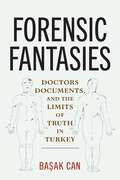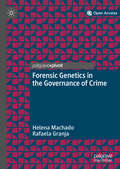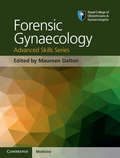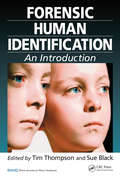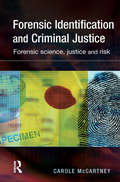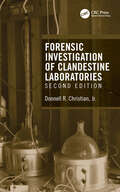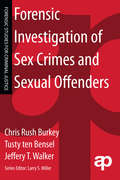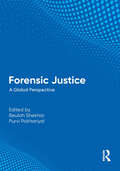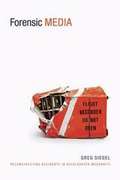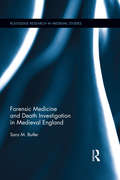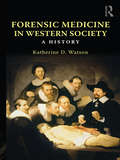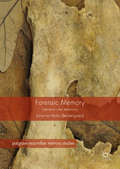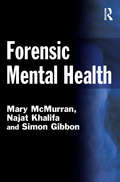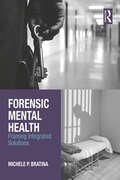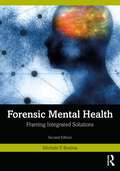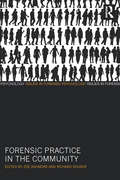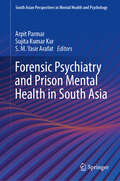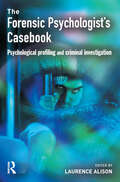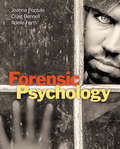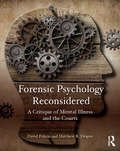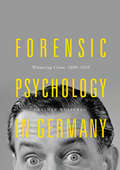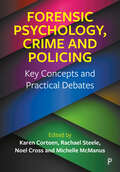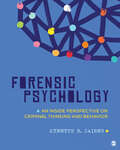- Table View
- List View
Forensic Fantasies: Doctors, Documents, and the Limits of Truth in Turkey
by Başak CanHow progressive doctors, medical institutions, and state forces in Turkey use forensic methods to detect, erase, and reveal evidence of state violenceForensic Fantasies explores the role of medical documentation and evidence in uncovering human rights violations. Anthropologist Başak Can examines how progressive doctors, medical institutions, and state forces in Turkey use forensic methods to detect, erase, reveal, and transform violence exerted against populations deemed to be enemies of the state.Through extensive ethnographic fieldwork with doctors engaged in forensic documentation of torture, Can shows how the shared belief in the power of medical witnessing to establish truth and justice brings political activists and medical experts into community with each other; at the same time, this belief, or “forensic fantasy,” as Can terms it, can actually further entrench state power through its reliance on legal and administrative recognition of the violence it is seeking to document.Unpacking the epistemological frameworks, political histories, institutional and legal structures, professional networks, and daily practices that give rise to and sustain these forensic fantasies, Can exposes the possibilities and limits of radical documentation as a political project. Shedding new light on the tensions of our contemporary post-truth moment, Can demonstrates how forensic fantasies are vital for forming communities of experts who oppose regimes of denial and ignorance, but at the same time, have limited political efficacy in bringing about change and countering state violence.
Forensic Genetics in the Governance of Crime
by Helena Machado Rafaela GranjaThis open access book uses a critical sociological perspective to explore contemporary ways of reformulating the governance of crime through genetics. Through the lens of scientific knowledge and genetic technology, Machado and Granja offer a unique perspective on current trends in crime governance. They explore the place and role of genetics in criminal justice systems, and show how classical and contemporary social theory can help address challenges posed by social processes and interactions generated by the uses, meanings, and expectations attributed to genetics in the governance of crime. Cutting-edge methods and research techniques are also integrated to address crucial aspects of this social reality. Finally, the authors examine new challenges emerging from recent paradigm shifts within forensic genetics, moving away from the construction of evidence as presented in court to the production of intelligence guiding criminal investigations.
Forensic Gynaecology
by Maureen DaltonThis comprehensive book covers the care of victims of sexual and domestic violence. Containing much practical advice - including writing legal reports and court skills, and issues of consent and capacity - the content highlights throughout the need to provide good-quality care to victims, not just for successful prosecutions but, more importantly, for the sake of the victim's mental and physical health. There are chapters on important topics such as child sex exploitation, female genital mutilation, male victims, training, and psychological issues. The content covers the syllabi for DFCASA, MFFLM(SOM) Part 2, and the RCOG ATSM in forensic gynaecology. This book is recommended for gynaecologists, sexual health doctors and nurses, genitourinary medicine doctors and nurses, emergency medicine doctors and nurses, midwives, counsellors and psychologists who work with victims, paediatricians, forensic doctors and nurses, specialist police officers and lawyers, and those working in sexual assault referral centres and independent sexual violence advisers.
Forensic Human Identification: An Introduction
by Tim Thompson Sue BlackIdentity theft, criminal investigations of the dead or missing, mass disasters both by natural causes and by criminal intent � with this as our day to day reality, the establishment and verification of human identity has never been more important or more prominent in our society. Maintaining and protecting the integrity of out identity has reached
Forensic Identification and Criminal Justice
by Carole McCartneyThis book provides an account of the development of forensic identification technologies and the way in which this has impacted upon the legal system. It traces the advent of forensic identification technologies, focusing on fingerprinting and forensic DNA typing, and their growing deployment within the criminal justice system. It also elucidates the ways in which these new technologies are accelerating procedural changes to investigative practices, and shows the ways in which in some areas human rights (such as privacy rights and rights against discrimination) are coming under threat. The use of forensic evidence in criminal investigations and trials is analysed in detail. This book uncovers the way in which this new reliance on forensic technologies has gained a foothold within the criminal justice system, and the risks and dangers that this can pose. The National DNA Database provides a particular focus of attention. The author seeks to move beyond an approach that has seen forensic DNA profiling as error free, situating her analysis within broader risk discourses.
Forensic Investigation of Clandestine Laboratories
by Donnell R. Christian, Jr.Forensic Investigation of Clandestine Laboratories, Second Edition is fully updated to address all aspects of the forensic investigation of clandestine laboratories. While, the first edition focused on the domestic clandestine manufacture of contraband substances, this edition expands the scope to more fully address the clandestine manufacture of explosives that have become a threat that is global in nature. In clandestine laboratory operations, equipment is often simple, household chemical products are utilized, and the education of the operators basic. In fact, most of the time these elements individually are perfectly legal to sell and possess. However, the combination of all these elements is what becomes the scene of illicit activity and a criminal operation. In response to the increase in use of homemade explosive mixtures by terrorists, both domestically and internationally, the section clandestine manufacture of explosives is greatly enhanced. Topics are presented in a manner which, while detailed, will not compromise the tactics, techniques, or procedures utilized by law enforcement and military personnel in their ability to combat the clandestine manufacture of contraband substances and the battle against domestic and international terrorism. Key features: • Examines tell-tale signs to look for in recognizing a clandestine lab • Outlines how to safely process the site of a clandestine lab • Details how to analyze collected evidence in the examination laboratory • Provides guidelines as to what to derive from the physical evidence • Offers specific tactics to effectively present the opinions associated with evidence that has been collected during the investigation in a written report, military style briefing or to a jury in a legal proceeding. Forensic Investigation of Clandestine Laboratories, Second Edition guides the reader through the process of recognizing these illegal manufacturing operations. Then it examines the methods as to how to compile the volume of associated evidence into a package that can be presented in a court of law, or to military commanders for decisive action. It is an invaluable resource, that will prove useful to chemistry lab technicians, forensic investigators, fire and first responder professionals, military personnel, police investigative agencies and narcotics units, and lawyer trying cases involving clandestine labs.
Forensic Investigation of Clandestine Laboratories
by Donnell R. Christian, Jr.Forensic Investigation of Clandestine Laboratories, Second Edition is fully updated to address all aspects of the forensic investigation of clandestine laboratories. While, the first edition focused on the domestic clandestine manufacture of contraband substances, this edition expands the scope to more fully address the clandestine manufacture of explosives that have become a threat that is global in nature. In clandestine laboratory operations, equipment is often simple, household chemical products are utilized, and the education of the operators basic. In fact, most of the time these elements individually are perfectly legal to sell and possess. However, the combination of all these elements is what becomes the scene of illicit activity and a criminal operation. In response to the increase in use of homemade explosive mixtures by terrorists, both domestically and internationally, the section clandestine manufacture of explosives is greatly enhanced. Topics are presented in a manner which, while detailed, will not compromise the tactics, techniques, or procedures utilized by law enforcement and military personnel in their ability to combat the clandestine manufacture of contraband substances and the battle against domestic and international terrorism.Key features: • Examines tell-tale signs to look for in recognizing a clandestine lab• Outlines how to safely process the site of a clandestine lab• Details how to analyze collected evidence in the examination laboratory • Provides guidelines as to what to derive from the physical evidence• Offers specific tactics to effectively present the opinions associated with evidence that has been collected during the investigation in a written report, military style briefing or to a jury in a legal proceeding.Forensic Investigation of Clandestine Laboratories, Second Edition guides the reader through the process of recognizing these illegal manufacturing operations. Then it examines the methods as to how to compile the volume of associated evidence into a package that can be presented in a court of law, or to military commanders for decisive action. It is an invaluable resource, that will prove useful to chemistry lab technicians, forensic investigators, fire and first responder professionals, military personnel, police investigative agencies and narcotics units, and lawyer trying cases involving clandestine labs.
Forensic Investigation of Sex Crimes and Sexual Offenders
by Jeffery T. Walker Chris Rush Burkey Tusty Ten BenselThe investigation of sex crimes is a specific function for many law enforcement agencies, requiring an understanding of how to investigate, process crime scenes, interact with victims and offenders, and prepare for court. Drawing on new methods of investigation and the effects of such crimes on victims, Forensic Investigation of Sex Crimes and Sexual Offenders provides in-depth coverage in these areas, offering a valuable supplement for criminal justice courses and an accessible guide for law enforcement.
Forensic Justice: A Global Perspective
by Beulah Shekhar Purvi PokhariyalForensic science is playing an increasingly important role in criminal investigations, as it provides scientific methods and techniques to gather and analyse evidence from crime scenes. Forensic evidence can be crucial in identifying suspects, linking them to the crime scene, and helping to secure convictions in court. In this sense, forensic science is seen as an aid to criminal investigation, providing reliable and objective evidence that can be used to uncover the truth behind criminal activities.The integration of forensic science with law and criminology is creating a new era of progressive thinking, where advanced techniques are being developed to better understand the nature of crime and the behaviour of criminals. With the help of forensic science, investigators can obtain speedy justice and bring criminals to book. However, this requires appropriate measures to be taken for the efficient execution of forensic investigations, including the use of modern technology and the training of professionals in the latest forensic techniques.Given the importance of forensic science in the criminal justice system, it is essential to have a comprehensive understanding of its different aspects. This includes the collection, preservation, and analysis of forensic evidence, as well as the interpretation of this evidence in the context of criminal investigations.This book covers these topics in detail, providing valuable insights for professionals, practitioners, academics, and students of the related fields.
Forensic Media: Reconstructing Accidents in Accelerated Modernity
by Greg SiegelIn Forensic Media, Greg Siegel considers how photographic, electronic, and digital media have been used to record and reconstruct accidents, particularly high-speed crashes and catastrophes. Focusing in turn on the birth of the field of forensic engineering, Charles Babbage's invention of a "self-registering apparatus" for railroad trains, flight-data and cockpit voice recorders ("black boxes"), the science of automobile crash-testing, and various accident-reconstruction techniques and technologies, Siegel shows how "forensic media" work to transmute disruptive chance occurrences into reassuring narratives of causal succession. Through historical and philosophical analyses, he demonstrates that forensic media are as much technologies of cultural imagination as they are instruments of scientific inscription, as imbued with ideological fantasies as they are compelled by institutional rationales. By rethinking the historical links and cultural relays between accidents and forensics, Siegel sheds new light on the corresponding connections between media, technology, and modernity.
Forensic Medicine and Death Investigation in Medieval England (Routledge Research in Medieval Studies #7)
by Sara M. ButlerEngland has traditionally been understood as a latecomer to the use of forensic medicine in death investigation, lagging nearly two-hundred years behind other European authorities. Using the coroner's inquest as a lens, this book hopes to offer a fresh perspective on the process of death investigation in medieval England. The central premise of this book is that medical practitioners did participate in death investigation – although not in every inquest, or even most, and not necessarily in those investigations where we today would deem their advice most pertinent. The medieval relationship with death and disease, in particular, shaped coroners' and their jurors' understanding of the inquest's medical needs and led them to conclusions that can only be understood in context of the medieval world's holistic approach to health and medicine. Moreover, while the English resisted Southern Europe's penchant for autopsies, at times their findings reveal a solid understanding of internal medicine. By studying cause of death in the coroners' reports, this study sheds new light on subjects such as abortion by assault, bubonic plague, cruentation, epilepsy, insanity, senescence, and unnatural death.
Forensic Medicine in Western Society: A History
by Katherine D. WatsonThe first book of its kind, Forensic Medicine in Western Society: A History draws on the most recent developments in the historiography, to provide an overview of the history of forensic medicine in the West from the medieval period to the present day. Taking an international, comparative perspective on the changing nature of the relationship between medicine, law and society, it examines the growth of medico-legal ideas, institutions and practices in Britain, Europe (principally France, Italy and Germany) and the United States. Following a thematic structure within a broad chronological framework, the book focuses on practitioners, the development of notions of ‘expertise’ and the rise of the expert, the main areas of the criminal law to which forensic medicine contributed, medical attitudes towards the victims and perpetrators of crime, and the wider influences such attitudes had. It thus develops an understanding of how medicine has played an active part in shaping legal, political and social change. Including case studies which provide a narrative context to tie forensic medicine to the societies in which it was practiced, and a further reading section at the end of each chapter, Katherine D. Watson creates a vivid portrait of a topic of relevance to social historians and students of the history of medicine, law and crime.
Forensic Memory
by Johanne Helbo BøndergaardThis book describes and analyses a particular literary mode that challenges the aesthetics of testimony by approaching the past through detection, analysis, and ‘archaeological’ digging. How does forensic literature narrate the past in terms of plot, language, narration, and use of visual media? This volume examines how forensic literature provides an important corrective to the forensic paradigm and a means of exploring the relationship between visual and material evidence and various forms of testimony. This literary engagement with the past is investigated in order to challenge a forensic paradigm that aims to eliminate the problems related to human testimony through scientific objectivity, resulting in a fresh and original text in which Bøndergaard argues literature’s potential to explore the mechanisms of representation, interpretation, and narration.
Forensic Mental Health (Criminal Justice Series)
by Mary McMurran Najat Khalifa Simon GibbonThis book provides a concise introduction to the increasingly important field of forensic mental health. It aims to set out both the key concepts in forensic mental health as well as the way the discipline operates in the broader context of criminal justice and mental health care systems. It will provide an ideal introduction to the subject for students taking courses in universities and elsewhere, for mental health practitioners in the early stages of their careers, and for professionals from other agencies needing an informed and up-to-date account of forensic mental health.
Forensic Mental Health: Framing Integrated Solutions
by Michele P. BratinaForensic Mental Health: Framing Integrated Solutions describes a criminal justice–mental health nexus that touches every population—juvenile and adult male and female offenders, probationers and parolees, the aging adult prison population, and victims of crime. In the United States today, the criminal justice system functions as a mental health provider, but at great cost to society. The author summarizes the historical roots of this crisis and provides an overview of mental illness and symptoms, using graphics to illustrate the most prevalent disorders encountered by police and other first responders. Bratina demonstrates in detail how the Sequential Intercept Model (SIM) supports integration of the U.S. healthcare and justice systems to offer more positive outcomes for offenders with mental illness. This book takes a multidisciplinary approach, addressing social work, psychology, counseling, and special education, and covers developments such as case-law related to the right to treatment and trauma-informed care. Designed for advanced undergraduates, this text also serves as a training resource for practitioners working with the many affected justice-involved individuals with mental illness, including juveniles, veterans, and substance abusers.
Forensic Mental Health: Framing Integrated Solutions
by Michele P. BratinaIn this book author Michele P. Bratina demonstrates how the Sequential Intercept Model (SIM) supports integration of the U.S. healthcare and justice systems to offer more positive outcomes for offenders with mental illness. The book describes a criminal justice–mental health nexus that touches every population—juvenile and adult male and female offenders, probationers and parolees, the aging adult prison population, and victims of crime. In the United States today, the criminal justice system functions as a mental health provider, but at great cost to society. The author summarizes the historical roots of this crisis and provides an overview of mental illness and symptoms, using graphics, case studies, and spotlight features to illustrate the most pressing issues encountered by justice and behavioral health professionals and the populations they serve. Forensic Mental Health takes a multidisciplinary approach, addressing social work, psychology, counseling, and special education, and covers developments such as case law related to the right to treatment and trauma-informed care. Designed for advanced undergraduates, this text also serves as a training resource for practitioners working with the many affected justice-involved individuals with mental illness and co-occurring substance use disorders, including juveniles and veterans.
Forensic Practice in the Community: Developments In Research And Practice
by Richard Shuker Zoë AshmoreForensic practice in the community is a neglected subject. There are many books looking at forensic work in secure settings, such as prisons or hospitals, but very little has been written about forensic practice in the community. This book describes the current and exciting developments in this area, for both young people and adults, by leaders in their field. It is in the community where interventions with those who have offended are all ultimately tested. Bringing together a range of experts from both the practitioner and academic community, this book covers: •multisystemic therapy for families, •sexual and violent offending, •learning disabilities, •substance misuse, •risk assessment, prediction and management, •personality disordered offenders •resettlement following custody, •desistance of criminal behaviour, •community interventions. Beginning with an overview of forensic practice in the community, the book addresses policy, practice and ethical issues, focusing on the specific dilemmas facing practitioners and providing an analysis of international perspectives. It describes how to meet the challenge of significantly diverting and reducing the prison population through more effective community intervention with adults and young people and also makes suggestions for the future. This book offers a range of recent case studies, has descriptions of new areas of community practice by those working or studying in that area and covers cutting-edge developments in practice and policy. It will be of interest to academics, practitioners and students in forensic psychology, as well as social workers, probation officers, youth offending officers, police officers, criminal justice agencies and mental health professionals.
Forensic Psychiatry and Prison Mental Health in South Asia (South Asian Perspectives in Mental Health and Psychology)
by S. M. Yasir Arafat Sujita Kumar Kar Arpit ParmarForensic psychiatry is an emerging branch of psychiatry in South Asian countries. The countries of the region have just started to concentrate on its importance. Very little is known about the extent of problems and available mental health services. The volume editors have not found a comprehensive book compiling the scenario from these eight countries. Therefore, this book will be the first of its kind. It will be helpful for clinical psychiatrists, psychiatric trainees, academics, researchers, legal practitioners, policymakers, and NGO personnel working with law enforcement and mental health. The book aims to provide a comprehensive evaluation of forensic psychiatry and related issues in South Asian countries. It will cover varied areas in this field, such as mental health and addiction laws capacity assessment, insanity defense, criminal responsibility, and prison mental health issues. The book will discuss these topics thoroughly, keeping in mind regional differences, such as different mental health legislatures and cultural variations.
Forensic Psychologists Casebook: Psychological profiling and criminal investigation
by Laurence AlisonThis book aims to demonstrate how forensic psychology contributes to police investigations, providing practical information about the type of reports provided by psychologists and behavioural advisors, and set within a broader theoretical context. It asks the question 'What do practitioners actually do when they provide advice for the police and the courts and how do they do it?' The contributors to the book are all experts in the field of offender profiling and behavioural investigative advice. The chapters provide valuable insights into particular case details, the ethical and legal consequences of advice, coverage of the relevant theoretical context, explanations for conclusions drawn, practical difficulties in preparing reports, potential pitfalls, and an account of how cases are resolved.
Forensic Psychology
by Craig Bennell Joanna Pozzulo Adelle ForthForensic Psychology takes a broad-based perspective, incorporating both experimental and clinical topics. This text includes current developments by theorists and researchers in the field. By focusing on multidisciplinary theories, readers gain an understanding of different forensic psychology areas, showing interplay among cognitive, biological, and social factors. Readers will find that the ideas, issues, and research in this text are presented in a style that they will understand, enjoy, and find useful in their professional careers.
Forensic Psychology Reconsidered: A Critique of Mental Illness and the Courts
by David Polizzi Matthew R. DraperForensic psychology is where psychology meets the criminal justice system. An understanding of the intersection of criminal law and psychological issues relating to criminal responsibility is critical for criminal justice students. This accessible text focuses on the criminal law implications of forensic psychology as it relates to topics such as competency to stand trial, state of mind at the time of the crime, suicide by cop, and involuntary psychiatric medication administered in custody. Unlike more traditional texts on this topic, which are primarily concerned with the clinical practice of forensic psychology, this book focuses on critical thinking as it relates to these topics. Each chapter presents a critical analysis of the topic under study, going beyond merely identifying the legal parameters of criminal responsibility to explore the ethical, philosophical, and theoretical foundations of that concept.
Forensic Psychology in Germany
by Heather WolfframThis book examines the emergence and early development of forensic psychology in Germany from the late nineteenth century until the outbreak of the Second World War, highlighting the field’s interdisciplinary beginnings and contested evolution. Initially envisaged as a psychology of all those involved in criminal proceedings, this new discipline promised to move away from an exclusive focus on the criminal to provide a holistic view of how human fallibility impacted upon criminal justice. As this book argues, however, by the inter-war period, forensic psychology had largely become a psychology of the witness; its focus narrowed by the exigencies of the courtroom. Utilising detailed studies of the 1896 Berchtold trial and the 1930 Frenzel trial, the book asks whether the tensions between psychiatry, psychology, forensic medicine, pedagogy and law over psychological expertise were present in courtroom practice and considers why a clear winner in the “battle for forensic psychology” had yet to emerge by 1939.
Forensic Psychology, Crime and Policing: Key Concepts and Practical Debates
by Karen Corteen, Rachael Steele, Noel Cross and Michelle McManusA key resource for students, academics and practitioners, this concise guide brings together various concepts vital to the theoretical, policy and practical debates on forensic psychology and its relationship with crime and policing. Covering issues such as criminal behaviour, police decision making and crime scene investigation, each entry provides a succinct overview of the topic, together with an evaluation of the emerging issues. The text includes: • associated concepts and further reading from research and practice; • references and glossary. Accessible and comprehensive, this book is the go-to guide for those getting to grips with the relationships between forensic psychology, crime and policing.
Forensic Psychology: An Inside Perspective on Criminal Thinking and Behavior
by Kenneth B. CairnsForensic Psychology: An Inside Perspective on Criminal Thinking and Behavior offers undergraduates a concise, accessible introduction to the field of forensic psychology. With more than 20 years of experience as a forensic psychologist working with incarcerated people, Dr. Kenneth B. Cairns provides a balance between not just forensics and psychology, but also between theory and practical application. Grounded in the cognitive-behavioral approach and evidence based-practices and research, this text will focus on often-overlooked areas, such as the experiences of victims and first responders and the psychopathy of individuals convicted of mass murder, spree killing, and serial killing.
Forensic Psychology: An Inside Perspective on Criminal Thinking and Behavior
by Kenneth B. CairnsForensic Psychology: An Inside Perspective on Criminal Thinking and Behavior offers undergraduates a concise, accessible introduction to the field of forensic psychology. With more than 20 years of experience as a forensic psychologist working with incarcerated people, Dr. Kenneth B. Cairns provides a balance between not just forensics and psychology, but also between theory and practical application. Grounded in the cognitive-behavioral approach and evidence based-practices and research, this text will focus on often-overlooked areas, such as the experiences of victims and first responders and the psychopathy of individuals convicted of mass murder, spree killing, and serial killing.
